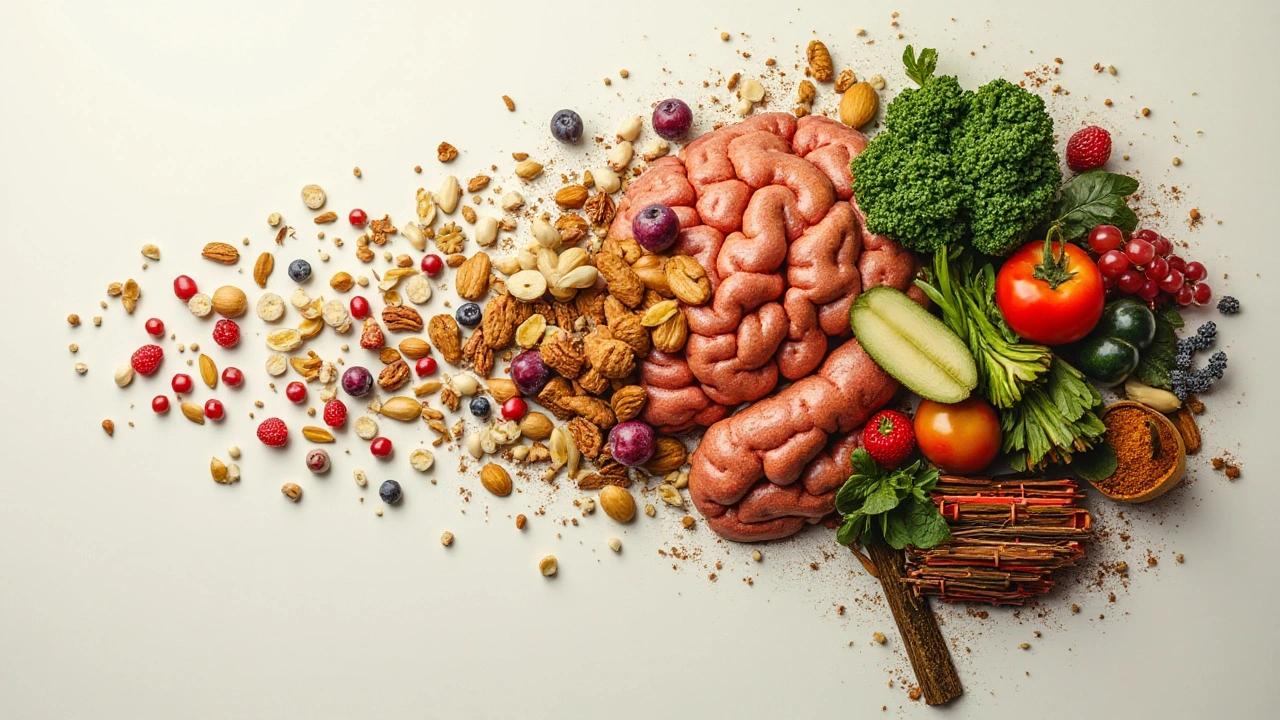
In the past, a healthy diet was mainly seen as a route to physical well-being. However, research over recent years has shed light on its significant influence on our mental health as well. The food choices we make every day can impact our mood, cognitive functions, and overall psychological well-being.
As people become more aware of the link between dietary habits and mental states, it becomes increasingly evident that maintaining a balanced diet is not just about nourishing the body but also the mind. In this article, we delve into the fascinating interplay between what we eat and how we feel, offering insights and tips to help you make mindful and healthy choices that support a happier and healthier you.
- The Connection Between Diet and Mental Health
- Nutrients That Support a Healthy Mind
- Foods to Include and Avoid
- Adopting a Nutrition-Based Lifestyle
The Connection Between Diet and Mental Health
The link between a healthy diet and mental health has become an intriguing focal point in scientific research. What we eat directly affects our brain structure and function, and therefore plays a vital role in our emotional stability. Experts suggest that diets rich in fruits, vegetables, whole grains, lean proteins, and healthy fats contribute positively to mental well-being. On the flip side, diets heavy in processed foods, high sugars, and unhealthy fats can exacerbate mental health problems such as anxiety and depression. People are becoming more sensitive to how dietary inputs might lead to better psychological outcomes in their daily lives. Nutrition is vital in fostering the intricate balance of brain chemistry that keeps moods stable and energy levels consistent, allowing for a more joyful perspective on life.
Our gut ecosystem, often referred to as the "second brain," houses billions of bacteria that play a crucial role in our mood regulations. This connection, known as the gut-brain axis, reveals that what we consume influences the levels of neurotransmitters like serotonin and dopamine. Fermented foods like yogurt, kefir, and miso, which are rich in probiotics, are known to enhance gut flora health. This, in turn, potentially alleviates stress and improves mood. Recent findings by the Food and Mood Centre in Australia emphasize that a diet rich in vegetables and unprocessed foods aligns with lower levels of depression. These findings are observed in youths, suggesting that early dietary interventions might be critical for long-term mental health benefits. Understanding that cheese and charcuteries are just as pivotal to our mental joy as they are to our taste buds showcases that dietary pleasure can coexist with health benefits.
"Nutritional psychiatry is a growing discipline that focuses on the use of food and supplements to provide these essential nutrients as part of an integrated or complementary treatment for mental health disorders." – Dr. Uma Naidoo
Another important aspect is how dietary habits impact inflammation in the body. Chronic inflammation is associated with numerous mental health issues, including distressed mood disorders. Anti-inflammatory foods such as leafy greens, berries, nuts, and fatty fish could regulate inflammation, thereby potentially reducing the risk of mental distress. Hydration also plays a critical role that shouldn't be overlooked; adequate water intake is necessary for the optimal functioning of brain cells. Meeting the body's water needs can lead to better concentration, improved sleep quality, and uplifted moods, all contributing to a healthier mental state. While more research is needed to establish direct causal links, even small dietary changes, like incorporating omega-3 fatty acids found in fish or flaxseeds, can be monumental.
Access to healthy food plays a role in social settings as well, where shared healthy meals can enhance community bonds and reduce feelings of isolation, often associated with poor mental health. Schools, workplaces, and homes adopting communal eating practices centered around healthy foods may cultivate a more supportive environment. The social facet of eating also impacts mental health, as shared meals often encourage balanced nutrition while reducing the risk of unhealthy dietary choices.
In summary, integrating the right foods into daily meals can provide an accessible route to improved mental health. As society grows more conscious of the direct correlation between food and brain function, the adoption of a nutrition-conscious lifestyle could serve as a cornerstone for psychological strength and resilience. Making informed food choices, staying hydrated, and being mindful of what you eat can create a more vibrant, healthy mind that enriches life satisfaction and well-being.

Nutrients That Support a Healthy Mind
There is an intricate relationship between what we consume and how our mental faculties operate. Understanding the nutrients that bolster brain health is a step towards nurturing your psychological well-being. Imagine a symphony where each instrument has its own role to play; similarly, various nutrients contribute uniquely to keeping your mental health in tune. Omega-3 fatty acids, found abundantly in fish like salmon, are celebrated for their role in brain health. These essential fatty acids can reduce inflammation, a known factor in causing mood disorders. Including Omega-3s in your diet could potentially lower the risk of depression and anxiety.
Another crucial nutrient is Vitamin D, often dubbed the 'sunshine vitamin' due to our body's ability to produce it when exposed to sunlight. Research suggests that low levels of Vitamin D can lead to increased feelings of depression and anxiety, highlighting its importance in our dietary intake. B vitamins, including B6 and B12, also play a vital role in the production of neurotransmitters, such as serotonin, which directly affects mood regulation. Folate, or Vitamin B9, known for its brain-boosting properties, can be found in leafy greens and is essential for maintaining a healthy mind.
"Good nutrition creates health in all areas of our existence. All parts are interconnected," said T. Colin Campbell, a renowned biochemist known for his work on the relationship between diet and disease.
Antioxidants, prominently found in berries, nuts, and green tea, defend the brain against oxidative stress which can accelerate the aging process. Polyphenols, particularly resveratrol, in red grapes and peanuts, help improve memory and focus. Antioxidants like Vitamin C and E are instrumental in combating oxidative stress, thus preserving cognitive function. Minerals like zinc and magnesium are equally important; they play a role in nerve function and neurotransmitter activity, making them vital for sustaining healthy mental health.
Here's a handy table summarizing where you can source these vital nutrients:
| Nutrient | Food Sources |
|---|---|
| Omega-3 Fatty Acids | Salmon, Chia Seeds, Walnuts |
| Vitamin D | Cod Liver Oil, Fortified Milk, Sunlight |
| B Vitamins | Whole Grains, Lentils, Eggs |
| Antioxidants | Blueberries, Dark Chocolate, Kale |
| Magnesium | Spinach, Almonds, Cashews |
So, next time you plan your meals, remember what your brain might be craving. Including a variety of foods rich in these vital nutrients can help ensure that your mind remains sharp and your mood stable. A diet inclusive of these elements supports not only a healthy body but a resilient and robust mental state, setting the stage for a well-rounded well-being.

Foods to Include and Avoid
Understanding which foods to include in your diet and which ones to avoid can make a substantial difference in your mental health. There's a wealth of evidence suggesting that the nutrients in our meals directly influence brain chemistry, shaping our mood, memory, and even our stress levels. Including the right foods can help ensure that your mental well-being remains robust while avoiding certain foods can prevent detrimental effects on your mental health.
First on the list of foods to incorporate are omega-3 fatty acids, which are predominantly found in fish like salmon, sardines, and mackerel. These essential fats have been extensively researched for their impact on brain health, with studies showing they may help combat depression and anxiety. Leafy greens such as spinach and kale are another powerhouse for the mind, rich in folate and magnesium, which support a balanced mood and reduce fatigue. Whole grains like oats and brown rice are rich in B vitamins, known to play a role in neurotransmitter production—a deficiency can often result in mood swings and irritability.
Additionally, fermented foods like yogurt, kimchi, and sauerkraut, laden with probiotics, play a significant role in maintaining gut health. Since the gut and brain are interconnected, a healthy gut can enhance mood and mental function. Equally important are nuts and seeds, such as almonds and flaxseeds, which provide a good source of healthy fats and other brain-boosting nutrients. A diet brimming with colorful fruits and vegetables can also assist in optimizing brain function, thanks to their high antioxidant content.
On the flip side, keeping an eye on foods to limit or avoid is equally important. Processed foods, especially those high in sugar and trans fats, have been correlated with a decline in mental health. These ingredients are known to cause inflammation and oxidative stress, which can hamper brain functions and elevate symptoms of depression. Aspartame, a common artificial sweetener, has been shown to block the production of serotonin, leading to mood swings and anxiety. It's no wonder experts consistently advise reducing the intake of sugary snacks and drinks. As Harvard Medical School notes, "The foods we eat influence how we feel."
"Proper nutrition is the key to unlocking our physical and mental potential," says Dr. Eva Selhub, an expert in nutrition and integrative health.
It's worth noting that while some people may find solace in caffeine, excessive consumption may lead to heightened anxiety and disrupted sleep patterns. Moderation is key, and choosing healthier alternatives like green tea, which comes packed with antioxidants, may support better mental clarity. With these considerations in place, making strategic dietary decisions becomes an act of not just nourishing the body, but nurturing the mind as well.

Adopting a Nutrition-Based Lifestyle
Understanding the profound connection between our diet and our mental health is just the beginning of a transformative journey. Embracing a nutrition-based lifestyle involves awareness and intentionality about the foods we consume daily. It is a lifestyle choice that not only aims to optimize physical health but also seeks to foster emotional and psychological balance. Imagine starting each day with a sense of vitality that sprouts from the food on your plate. Choosing foods rich in essential nutrients can lead to improved mood stability and better overall brain function.
Key components of adopting a nutrition-based lifestyle include diversity, balance, and moderation. This means incorporating a wide range of food groups into your meals: whole grains, fresh fruits and vegetables, lean proteins, and healthy fats. Whole foods, unprocessed and in their natural state, should be the cornerstone of this nourishing diet. By reducing intake of processed foods laden with additives and sugars, you pave the way for clearer mental processing and more stable energy levels throughout the day.
Practical Steps to Begin
Making the shift towards a nutrition-based lifestyle is about taking small, manageable steps which add up to significant change over time. Begin by evaluating your current dietary habits with an honest lens. Are there particular times when your eating patterns fall short of the nutrients needed for mental clarity and focus? Replace these missing nutrients by adding foods known to support brain health, such as fatty fish rich in Omega-3 fatty acids, nuts and seeds for healthy fats, and leafy greens packed with vitamins.Family meals can be a wonderful opportunity to enact these changes. Getting everyone involved in selecting recipes, shopping for ingredients, and preparing meals creates a supportive environment where healthier choices become a shared goal. Visualization is also a powerful tool: imagine your mind as a garden that requires a wide variety of nutrients to blossom.
Citing the importance of early nutrition in mental health, Dr. Rachel V. Gow, a respected neuroscientist, states, "What we put into our bodies directly impacts the size and function of the brain. A varied diet supports neuronal connections, which are vital for learning and mental resilience."
Overcoming Challenges and Building Habits
As with any lifestyle change, adopting a nutrition-based lifestyle may encounter obstacles. Time constraints, a lack of cooking skills, or a familiarity with processed foods can pose genuine challenges. Overcoming these hurdles requires planning and education. Invest in learning quick, nutritious recipes that do not compromise on nutritional value. Meal prepping over the weekend can save invaluable time during busy weekdays. Engaging in mindful eating practices, where you pay attention to the flavors and textures of food without distraction, may also enhance your appreciation for wholesome meals.Commitment to a nutritional lifestyle is not just about instant results but about cultivating sustainable habits. Think of it as laying down a sturdy foundation for lifelong mental and physical well-being. With time, the benefits of this approach will manifest, allowing you to enjoy enhanced mood and mental acuity.





